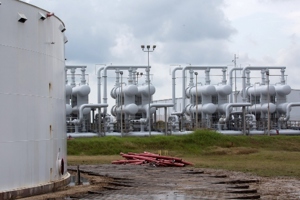U.S. Senate backs measure barring oil sales to China from SPR
(Reuters) - The U.S. Senate overwhelmingly passed an amendment to an annual defense bill on Thursday that would ban exports to China of oil from the Strategic Petroleum Reserve.
The tally was 85 to 14 in favor of the measure, beyond the 60 votes needed in the 100-member Senate to add the amendment to the National Defense Authorization Act, or NDAA, legislation that sets policy for the Department of Defense that is expected to be passed later this year.
The desire for a hard line on China is one of the few truly bipartisan sentiments in the divided U.S. Congress, and members of Congress have introduced dozens of bills seeking to address competition with China's communist government.
The amendment was sponsored by Senators Joe Manchin, a Democrat, and Ted Cruz, a Republican, who say the ban would protect national security.
The issue of SPR sales to China heated up after President Joe Biden, a Democrat, announced the sale last year of 180 million barrels from the SPR to tame gasoline prices that spiked on Russia's war on Ukraine.
The sale pushed levels in the SPR to the lowest in 40 years. Critics in Congress say the low level reduces U.S. energy security even though the country produces much more oil than it did in 1983, thanks to advances in fracking.
Last July, in a sale of 39 million barrels from the SPR that was part of the 180 million-barrel release, 1 million barrels went to UNIPEC America, a Houston-based arm of China's Sinopec. In 2017, under former President Donald Trump, some SPR oil was sold to PetroChina International, a subsidiary of Chinese state oil company PetroChina Co Ltd.
Senator Chris Murphy, a Democrat who opposed the ban, said it "creates the illusion of solving a problem while having very little political impact and likely doing more harm than good."
Last year U.S. oil companies sold more than 83 million barrels to China. This year the trend is up with oil exports to China through April totaling more than 76 million barrels.
The House and Senate will next go to conference to work out a final bill that has to be passed by both chambers and be passed by Biden to become law.
Benjamin Salisbury, an analyst at Height Capital Markets, said it was unlikely that a ban would have "any systemic impact on the functioning of the SPR which is done through a competitive bid in a relatively liquid market."







Comments